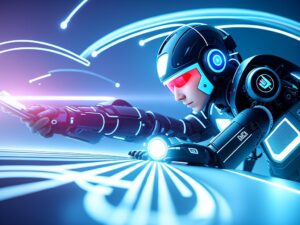How AI is Transforming Urban Life and Smart Cities: Enhancing Efficiency and Livability
Artificial Intelligence (AI) is significantly transforming urban life and smart cities.
AI enhances efficiency, sustainability, and quality of life for city residents by improving everyday services.
From managing traffic to optimising energy consumption, AI makes city operations more intelligent and responsive.
In cities like Songdo, South Korea, AI-driven urban planning has been employed to manage everything from energy to waste management.
The intersection of AI and the Internet of Things (IoT) is another major factor driving this transformation.
By merging AI with IoT, smart cities achieve greater efficiency and better resource management. This combination allows for real-time analysis and decision-making, making cities not only smarter but more livable.
Urban transportation solutions and other applications are expected to grow by over 30% by 2025, making significant improvements in resilience and sustainability.
In addition to resource management, AI impacts healthcare, public safety, and social welfare in urban areas.
From predictive policing to emergency responses, smart cities are becoming safer and more efficient. With these advancements, AI is setting the stage for a future where urban life is continuously improved.
Key Takeaways
- AI enhances the efficiency and quality of urban life.
- The combination of AI and IoT improves resource management in smart cities.
- AI impacts healthcare, safety, and social welfare in urban areas.
Defining Smart Cities and AI
Smart cities leverage cutting-edge technologies to improve urban life. At the heart of this transformation is artificial intelligence (AI), which plays a critical role in enhancing various aspects of urban infrastructure and services.
Characteristics of Smart Cities
Smart cities integrate information and communication technologies (ICT) to optimise urban functions, drive economic growth, and improve residents’ quality of life.
They employ sensors, data analytics, and IoT devices to collect and analyse data. This helps manage resources efficiently and reduce pollution.
Public services such as transportation and healthcare benefit from improved responsiveness and efficiency.
Smart street lighting, waste management, and energy grids illustrate this optimisation. Cities like Singapore and Barcelona are leaders in adopting these technologies to deliver real-time solutions to urban challenges.
Role of Artificial Intelligence (AI)
AI serves as the backbone of smart cities, enabling them to process vast amounts of data for better decision-making.
It enhances infrastructure by predicting maintenance needs and managing traffic flows in real-time.
In transportation, AI helps in developing smart traffic signal systems and autonomous vehicles or AI cars. Public safety systems, powered by AI, can predict and respond to crime patterns and emergencies efficiently.
AI also aids in city planning by analysing data trends to make informed decisions, ensuring sustainable development. These advancements ensure that urban areas become more sustainable, resilient, and amenable to quality living.
Infrastructure and Technologies
AI and IoT technologies are significantly enhancing urban infrastructure and smart grids. These advancements drive increased efficiency, better energy management, and improved quality of life for city residents.
Development of Urban Infrastructure
Urban infrastructure is seeing remarkable changes due to the integration of AI.
AI systems analyse vast amounts of data to optimise traffic management, reducing congestion and improving public transportation reliability.
For instance, sensors installed across cities collect real-time data, helping to adjust traffic lights and routes dynamically.
Additionally, urban planning benefits greatly from predictive analytics.
Planners can foresee the impact of new buildings or roads on traffic flow and pollution levels. This data-driven approach allows for more sustainable development.
Furthermore, AI enhances utilities management by predicting maintenance needs, reducing downtime.
Key Points:
- Optimised Traffic Management: Sensors and real-time data.
- Predictive Analytics: Sustainable urban planning.
- Utilities Management: Predictive maintenance.
Innovations in IoT and Smart Grids
IoT devices play a crucial role in smart cities, connecting numerous sensors and systems.
For example, smart grids leverage AI and IoT to manage energy distribution efficiently. These grids balance energy loads, integrate renewable energy sources, and reduce wastage.
Such systems ensure that electricity is used optimally, preventing blackouts and reducing costs.
In addition to energy management, IoT devices contribute to improved urban services.
Waste management systems use smart bins to signal when they need to be emptied, making collections more efficient.
Similarly, smart water systems detect leaks, conserving water and reducing costs.
Key Points:
- Smart Grids: Efficient energy distribution.
- Waste Management: Smart bins and sensors.
- Water Systems: Leak detection and conservation.
Sustainability and Resource Management
Artificial Intelligence (AI) plays a critical role in improving sustainability and resource management in smart cities. It helps optimise energy use, manage waste efficiently, and ensure sustainable water usage.
Energy Management and Efficiency
AI systems can greatly improve energy efficiency in urban environments.
By using smart grids powered by AI algorithms, cities can better manage energy distribution. These grids balance supply and demand, reducing energy wastage and ensuring reliable electricity delivery.
Smart meters and sensors collect real-time data on electricity use. This data helps optimise energy utilisation by adjusting consumption during peak and off-peak hours. This results in lower energy bills for residents and less strain on the power grid.
AI also supports the integration of renewable energy sources like solar and wind.
By predicting energy output based on weather patterns, AI can manage the variability of renewable energy, making it more reliable.
Smart Waste Management and Water Usage
Effective waste management is essential for sustainable urban living.
AI-driven systems can monitor waste levels in bins and schedule pickups only when necessary. This reduces the number of waste collection trips, cutting down on fuel consumption and lowering carbon emissions.
Recycling processes also benefit from AI.
Advanced sorting technologies can identify and separate recyclable materials more accurately, increasing recycling rates and reducing landfill waste.
Water resource management is another critical area where AI shows promise.
AI can optimise water distribution, monitor water quality, and detect leaks in pipelines. This ensures that water is used efficiently and helps address issues like water scarcity.
Integrated water management systems can also predict and manage water demand, ensuring sustainable usage in both commercial and residential areas.
Mobility and Transportation
AI is redefining urban mobility and transportation by improving traffic management and introducing smart transportation systems, making cities more efficient and safer.
Traffic Management and Autonomous Vehicles
AI plays a crucial role in enhancing traffic flow and reducing congestion.
AI-powered traffic management systems analyse real-time data to adjust traffic signals and predict congestion patterns. This ensures smoother movement of vehicles and reduces waiting times at junctions.
Autonomous vehicles are another significant development. They use AI to navigate and make real-time decisions, enhancing public safety by reducing human error.
Self-driving cars and buses can optimise routes, further easing traffic congestion. These vehicles communicate with traffic management systems, creating a coordinated and efficient urban transportation network.
Smart Urban Transportation Systems
Smart urban transportation systems integrate various AI technologies to offer more efficient and sustainable mobility options.
These systems include ride-sharing services, electric vehicles, and integrated public transport networks. AI helps in planning and managing routes, thus reducing travel times and improving reliability.
Public transport systems benefit greatly from AI.
Predictive maintenance ensures that buses and trains are in optimal condition, reducing breakdowns and delays. Real-time information systems provide passengers with updates on schedules and delays, enhancing the user experience. These advancements contribute to a more responsive and adaptable urban transportation environment.
Healthcare and Public Safety
Artificial Intelligence (AI) enhances urban life by improving healthcare delivery and public safety. These advancements bring better quality of life to city dwellers through smart healthcare systems and more efficient surveillance and emergency response mechanisms.
Smart Healthcare Systems
AI plays a significant role in smart healthcare by enhancing medical services and making them more efficient.
Telemedicine allows doctors to diagnose and treat patients remotely, reducing the need for physical visits. This is particularly useful in densely populated urban areas, where healthcare facilities can be overwhelmed.
Predictive analytics helps in identifying potential health crises before they escalate. By analysing data from various sources, AI can predict outbreaks of diseases and advise on preventive measures.
Wearable devices equipped with AI are also becoming commonplace. These devices monitor vital signs and alert users and healthcare providers if they detect any anomalies, ensuring timely medical attention.
Surveillance and Emergency Response
AI-driven surveillance systems are crucial for maintaining public safety.
These systems use facial recognition technology to monitor and identify individuals in real-time, assisting law enforcement agencies in preventing crime. By integrating AI with CCTV cameras, authorities gain a powerful tool for monitoring public spaces.
Emergency response is greatly improved with AI.
Smart traffic management systems ensure that emergency vehicles reach their destinations swiftly by controlling traffic signals in real-time. AI can analyse large amounts of data from past emergencies to improve response strategies.
Drones equipped with AI are also being used for rapid assessment of emergency situations. They can quickly survey hazardous areas, providing first responders with valuable information that can save lives.
Data, Privacy, and Security
AI in smart cities generates vast amounts of data that improve urban living. However, this data brings challenges in ensuring privacy and security. Effective data analytics can drive better decision-making, but it also exposes sensitive information to risks.
Importance of Data Analytics
Data analytics plays a crucial role in the functioning of smart cities.
It helps in processing vast amounts of Big Data collected from various sources like IoT devices and sensors. These analytics aid in optimising urban planning, managing resources efficiently, and enhancing public services.
For instance, data from traffic sensors can be analysed to reduce congestion. Smart meters use data analytics to track energy use, promoting sustainability. Moreover, insights from data analytics help in making real-time decisions, improving city resilience and residents’ quality of life.
Challenges in Data Security and Privacy
The extensive use of data in smart cities raises significant concerns about data security and privacy. As cities collect more data, the risks associated with data breaches and misuse increase. Ensuring robust security measures to protect this data is essential.
Data privacy laws require that sensitive information of residents is safeguarded. Technologies like data encryption and secure access protocols are vital in protecting this data. Despite these measures, challenges persist, necessitating ongoing research and innovation in this field.
Another concern is the potential for surveillance and privacy invasion. Intelligent systems must balance data collection with individuals’ rights, ensuring that data is used ethically and responsibly.
Governance and Civic Engagement
In smart cities, artificial intelligence (AI) is reshaping how governments interact with citizens and deliver public services.
Citizen Participation in Smart Cities
AI allows for greater citizen engagement by providing more platforms for public participation.
These platforms can include mobile apps, online portals, and social media. Through these tools, residents can report issues, vote on local matters, and even offer suggestions for community improvements. This heightened level of interaction helps build a more transparent and accountable government.
Moreover, AI can analyse large volumes of data from these platforms to gauge public sentiment and needs. This allows local authorities to make decisions that are more aligned with the community’s desires. For example, data from social media can be used to identify areas needing immediate attention, such as road repairs or security improvements.
Smart Governance and Public Services
Smart governance leverages AI to streamline the delivery of public services. Automated decision-making systems can handle tasks like traffic management, waste collection, and emergency responses more efficiently.
For instance, AI algorithms can optimise traffic light timings to reduce congestion and improve urban mobility.
AI also plays a crucial role in resource management. It helps local governments allocate resources like water and energy more sustainably, reducing waste and improving service reliability.
In addition, AI-driven systems can offer personalised public services, such as custom healthcare recommendations, based on individual data.
Finally, AI makes it easier for citizens to access public services. Chatbots and virtual assistants can answer queries 24/7, reducing the need for physical office visits. This improves convenience for the public and allows government staff to focus on more complex tasks.
Economic and Social Impact
AI is transforming smart cities, affecting both the economy and society profoundly. It offers economic gains by boosting city operations and services and can bring significant social changes. Ethical considerations and new challenges also arise.
Economic Benefits of Smart Cities
Smart cities enhance efficiency, reduce costs, and improve service delivery. AI-driven city management systems optimise energy use, cutting utility bills.
Transport networks use AI for real-time traffic management, reducing congestion and fuel consumption. Smart grids and predictive maintenance help avoid costly breakdowns.
Start-ups and tech firms thrive, creating jobs and driving economic growth. AI also aids in revenue collection by tracking services, reducing unpaid bills.
Enhanced public safety systems lead to fewer crimes, lower law enforcement costs, and provide safer environments. Tourism benefits from AI-enhanced services that personalise visitor experiences.
Companies find cities more attractive for business, leading to investments and economic development. These AI-powered efficiencies and innovations provide economic stability for urban populations.
Societal Transformation and Challenges
AI impacts social structures, improving the quality of life for inhabitants. Healthcare systems use AI to predict outbreaks and personalise medical treatment, enhancing public health.
Education systems leverage AI to offer tailored learning, helping students succeed. Smart homes with AI support daily activities, benefiting the elderly and disabled.
Yet, disparities can emerge. AI might reinforce socio-economic divides, favouring those with access to technology. Discrimination issues arise if AI systems unintentionally exhibit biases.
Public surveillance raises ethical concerns about privacy. Continuous data gathering could infringe on individual freedoms.
Societal adaptation to AI requires policies ensuring equitable access and ethical AI use, guarding against discrimination. Balancing technology’s benefits with ethical considerations shapes the future of smart cities.
Frequently Asked Questions
Artificial intelligence (AI) is reshaping urban landscapes by improving various aspects of city living, from transportation to waste management, and even public safety.
What are the key ways in which artificial intelligence contributes to the development of smart cities?
AI enhances efficiency in city services, from automating administrative tasks to providing real-time data for decision-making. Technologies like the Internet of Things (IoT) and machine learning enable cities to address issues such as traffic congestion, pollution, and energy consumption.
How is AI enhancing transportation and mobility within urban environments?
AI optimises traffic flow through smart traffic lights and predictive algorithms. Autonomous vehicles and ride-sharing apps use AI to provide efficient and safe transport options.
Public transport systems utilise AI to manage schedules and routes, reducing delays and improving passenger experience.
In what manner is artificial intelligence influencing energy management in smart cities?
AI helps cities monitor and manage energy resources more effectively. Smart grids use AI to balance energy supply and demand, reducing waste.
Buildings equipped with AI can optimise their energy usage by adjusting lighting, heating, and cooling based on real-time data.
What role does AI have in improving public safety and security in urban areas?
AI enhances public safety through surveillance systems capable of identifying unusual activities. Predictive policing tools use AI to forecast crime hotspots, enabling better resource allocation.
Additionally, AI assists in disaster response by analysing data to inform emergency services quickly and accurately.
How is artificial intelligence used to optimise waste management in smart cities?
Waste management systems use AI to predict waste generation patterns, allowing for more efficient collection schedules. Smart bins equipped with sensors can alert waste management services when they are full, reducing overflow and improving urban cleanliness.
What impact does AI have on governance and citizen engagement in the context of a smart city?
AI streamlines administrative processes, making government services more accessible.
Chatbots and automated systems provide quick responses to citizen queries.
AI-powered platforms enable more transparent and participatory governance, encouraging residents to engage in city planning and decision-making.



















